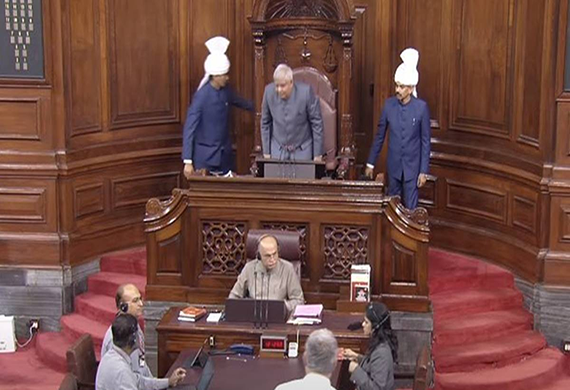
Rajya Sabha Creates History with 50% Women in Vice-Chairpersons Panel
By: WE Staff | Friday, 21 July 2023
The upper house of the Indian Parliament has reconstituted its panel of vice-chairpersons with half of its members being women. This historic decision, announced by Chairman Jagdeep Dhankhar during the monsoon session, received widespread appreciation from women members present.
The new panel of vice-chairpersons includes renowned athlete and Padma Shri awardee P T Usha, who was nominated to the Rajya Sabha in 2022. Another notable addition is S Phangnon Konyak, who has become the first woman from Nagaland to be nominated to the panel. She holds the distinction of being the second woman from the state to be elected to either House of Parliament or the state assembly.
Joining them are Fauzia Khan, V Vijaysai Reddy, Sulata Deo, Ghanshyam Tiwari, L Hanumanthaiah, and Sukhendu Sekhar Ray. What makes this development even more remarkable is that all four women nominated to the vice-chairperson panel are first-time members.
The move signifies a significant step towards gender representation and empowerment of women in the upper echelons of Indian politics. Chairman Jagdeep Dhankhar's commitment to promoting diversity and inclusivity has resulted in this unprecedented milestone for the Rajya Sabha.
The chairman has the authority to select a group of vice-chairpersons from among the council members in accordance with the rules. There may be no more than six vice-chairpersons on this panel, and in the absence of the chairman and deputy chairman, one of them may preside over the council.
The vice-chairpersons nominated will hold office until a new panel is nominated, as per the official sources in the Rajya Sabha. This action is anticipated to inspire more women to join in politics and hold leadership positions.
The historic equal representation given to women members in the panel of vice-chairpersons showcases the commitment of the Rajya Sabha to gender diversity and inclusivity. It sets a powerful example for other parliamentary bodies and institutions to follow, promoting a more equitable and representative political landscape.
As the Rajya Sabha embraces this transformative change, it has also become fully digital, embracing modern technology to enhance its functioning and accessibility. With this significant step towards gender equality and digital transformation, the Rajya Sabha is taking strides towards a more inclusive and progressive future.
Most Viewed
- 1 Women's Health Startup HerMD Closing Doors Amid Industry Challenges
- 2 5 Famous Women in Indian Armed Forces
- 3 Saudi Women No longer Require Male Permission for Clothing Choices, says Prince MbS
- 4 Kolkata Medtech Startup Innovodigm Raises Rs 5.5 Crore Seed Funding Led by IAN Group
- 5 Yamunanagar's Kashish Kalra Honoured after Securing 111th Rank in UPSC Civil Services Exam
- 6 Madurai Appoints Its First Woman Corporation Head
- 7 IAS Vijayalakshmi Bidari Appointed as the new Nagpur Divisional Commissioner
- 8 American Entrepreneur Lucy Guo Overtakes T Swift to become Youngest Female Billionaire
- 9 ICC Women's World Cup 2025 Trophy Showcased at Indore's Holkar Stadium
- 10 Aparna Saxena's Beauty Venture AntiNorm Launches in India
- 11 Vidya Nataraj Co-Founded BlueStone Jewellery & Lifestyle files IPO
- 12 5 Women Freedom Fighters of India
- 13 Dr. G Krishnapriya appointed as CEO for Trichy
- 14 M3M & Sirona Partner to Introduce Menstrual Hygiene Vending Machines in 15 Locations
- 15 Punjab Govt launches SHE Cohort 3.0 Supporting Tech-led Women Startups
- 16 Indian origin Lawyer, Sweena Pannu appointed as the US New Superior Court Judge
- 17 The Aurora Tech Award recognizes 4 Indian Women-led Startups
- 18 Kerala's Republic Day parade featured an all-female tableau
- 19 Manisha Kabbur Becomes Karnataka's First Woman International Karate Coach
- 20 Director K. S. Ravikumar's Daughter Maalica Ravikumar Launches Life Coaching Company 'Evergrowth Academy' for Women
- 21 Leezu's Raises Pre-Seed Funding to Accelerate Growth in Sexual Wellness Industry
- 22 Sattu: Super-easy summer drink for PCOS gut healing
- 23 Swathi Nelabhatla creates Sitha App, India's First Women-Exclusive Gig Platform
- 24 7 Timeless Female Kathak Dancers & their Iconic Legacies
- 25 Meet 7 Iconic Women Architects of Modern India & their Most Impactful Work
- 26 This Woman-led Insuretech Startup is Helping Bridge the Education Financing Gap in India
- 27 Women Leaders Share Lessons Learnt from India Women's WC Win
- 28 5 Enterprising Women Founders Powering Singapore's Tech & Innovation Landscape
- 29 4 Women. 4 Stories. One Vision for Smarter, Stronger Healthcare
- 30 Global Gender Gap Narrows to 68.8%, But Full Equality 123 Years Away: WEF Report 2025
- 31 Changemakers: 7 Women Entrepreneurs Taking the Make in India Movement Forward
- 32 Meet Lucy Guo, The Youngest Self-Made Female Billionaire Disrupting Tech
- 33 How Women are Driving India's Festive Online Shopping Surge






